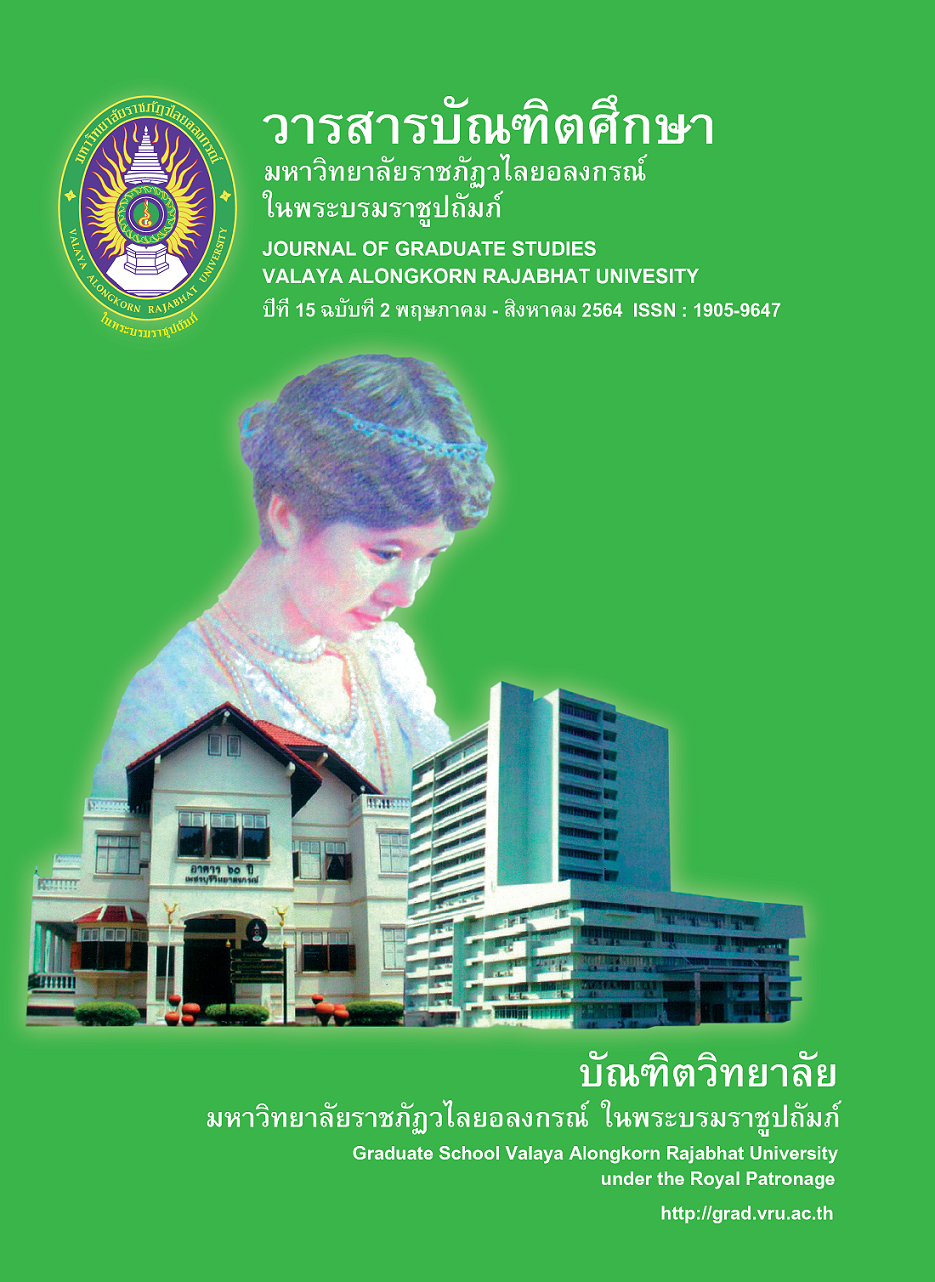USING PHENOMENON – BASED LEARNING APPROACH TO DEVELOP GRADE 5 STUDENTS MATHEMATICALS CONNECTION SKILLS IN GEOMETRY
Main Article Content
Abstract
This qualitative action research aims here to implement Phenomenon – Based learning approach (PhBL), and to examine Mathematical connection skills in Geometry of 12 fifth grade students’ in Opportunity Expansion School in Kamphaeng Phet. The instruments were lesson plans, reflective journals, Mathematical connection skill test and worksheets. The research comprising of 3 cycles as follows 1) Plan 2) Act 3) observe and 4) Reflect. Data were analyzed by content analysis and data creditability by data triangulations.
The results revealed that the teacher has to choose phenomenon in accordance with school or village, use questions to encourage students to connect knowledge, has good interaction with students and assess their skills by variety of ways. Also this research found that their Mathematical connection skills increased all elements as follow the connection between mathematics and mathematics, the connection between mathematics and others and the connection between mathematics and daily life.
Article Details

This work is licensed under a Creative Commons Attribution-NonCommercial-NoDerivatives 4.0 International License.
บทความทุกเรื่องได้รับการตรวจความถูกต้องทางวิชาการโดยผู้ทรงคุณวุฒิ ทรรศนะและข้อคิดเห็นในบทความ Journal of Global of Perspectives in Humanities and Social Sciences (J-GPHSS) มิใช่เป็นทรรศนะและความคิดของผู้จัดทำจึงมิใช่ความรับผิดชอบของบัณฑิตวิทยาลัย มหาวิทยาลัยราชภัฏวไลยอลงกรณ์ ในพระบรมราชูปถัมภ์ กองบรรณาธิการไม่สงวนสิทธิ์การคัดลอก แต่ให้อ้างอิงแหล่งที่มา
References
Butkatunyoo, O. (2018). Kān rīanrū dōi chai prākotkān pen thān phư̄a kān sāng mum mō̜ng bǣp ong Rūam læ kān khao thưng lōk hǣng khwām čhing khō̜ng phū rīan [Phenomenon based Learning for Developing a Learner’s Holistic Views and Engaging in the Real World]. Journal of Education Studies, Chulalongkorn University. 46(2), 348-365.
Daehler, K., & Folsom, J. (2019). Making Sense of SCIENCE: Phenomena-Based Learning. Retrieved May 22, 2019, from http://www.WestEd.org/mss.
Kaew-um, R. (2017). Kān phatthanā kitkam kānrīan kānsō̜n thī nēn kān chư̄amyōng thāng khanitsāt Dōi chai panhā pen thān Samrap nakrīan chan matthayom sưksā pī thī 3 [Developing of Learning activities focusing on Mathematical connection use Problem-Based Learning for grad 9 students]. Journal of Education, Naresuan University. 19(4), 214-222.
Kijkuakul, S. (2014). Kān čhat kān rīanrū witthayāsāt, Thit thāng sam rap khrū thotsawat thī Yī sipʻet [Learning science management, Directions for teachers in the 21st century]. 1st ed. Phetchabun: Juldis Printing.
Makanong, A. (2010). Thak sa læ kra būan kān thāng khanitsāt: Kān phatthanā phư̄a phat tha nā kān [Mathematical skills and processes: Development for development]. Bangkok: Chulalongkorn University.
Ministry of Education. (2019). Kān čhat kān rīanrū læ kān rīanrū tām nǣothāng khō̜ng kān Čhat kān rīanrū dōi chai prākotkān pen thān [Learning Management and learning according to the guidelines of Manage learning by using phenomenal as the basis]. In Kān ob rom læ sammanā kān čhat kānrīan kānsō̜n witthayāsāt sam rap phū mī khwām sāmāt pi set dān Witthayāsāt læ khanitsāt Na University of Helsinki Pra thed finlǣn [training and seminars on science teaching for gifted people in science and Mathematics at the University of Helsinki, Finland] (pp. 4-17). Bangkok: Ministry of Education.
National Council of Teachers of Mathematics (NCTM). (2000). Principle and Standards for School Mathematics. Reston, Virginia: National Council of Teachers of Mathematics.
Petchrung, K. (2013). Kān phatthanā chut kitkam kānrīanrū tām nǣo kānsưksā khanitsāt thī sō̜t khlō̜ng kap chīwitčhing phư̄a songsœ̄m manōthat læ khwāmsāmāt nai kān chư̄amyōng khwām rū khanitsāt [Development of learning activity package based on realistic mathematics education to enhance mathematical concept and connection ability]. Master of Education Thesis. Chulalongkorn University.
Srithi, K., Supap, W., & Wiriyapong, R. (2018) Kān wi čhai pa tibatkān phư̄a phatthanā kān čhat kān rīanrū bǣp chaipanhā penthān thī songsœ̄m ānrūrư̄angkhanitsāt Rư̄ang Phāktatkrūai khō̜ng nakrīan chan matthayomsưksāpīthī Sī [An Action Research on Developing Problem-based Learning Activities to Enhance Mathematical Literacy in Conic Sections Topic of Students in Grade 10]. Social Sciences Research and Academic Journal, Nakhon Sawan Rajabhat University. 13(37), 105-118.
The Institute for the Promotion of Teaching Science and Technology (IPST). (2017). Khūmư̄ kān chai laksūt Klum sāra kānrīanrū khanitsāt (cha bap prap prung 2560) [Course manual for mathematics learning (Revised version 2017) according to the core curriculum of basic education in 2008, elementary level]. Ministry of education.


